- Home
- Georgette Heyer
Snowdrift and Other Stories
Snowdrift and Other Stories Read online
Contents
About the Book
About the Author
Also by Georgette Heyer
Title Page
Introduction by Jennifer Kloester
Snowdrift
Full Moon
Pistols for Two
A Clandestine Affair
Bath Miss
Pink Domino
A Husband for Fanny
To Have the Honour
Night at the Inn
The Duel
Hazard
NEW STORIES
Pursuit
Runaway Match
Incident on the Bath Road
Copyright
About the Book
Affairs of honour between bucks and blades, rakes and rascals; affairs of the heart between heirs and orphans, beauties and bachelors; romance, intrigue, escapades and duels at dawn. All the gallantry, villainy and elegance of the age that Georgette Heyer has so triumphantly made her own are exquisitely revived in these wonderfully romantic stories of the Regency period.
A treat for all fans of Georgette Heyer, and for those who love short stories full of romance and intrigue.
This collection also includes three stories not seen since 1939, published in book form for the very first time.
About the Author
Author of over fifty books, Georgette Heyer is the best-known and best-loved of all historical novelists, who made the Regency period her own. Her first novel, The Black Moth, published in 1921, was written at the age of seventeen to amuse her convalescent brother; her last was My Lord John. Although most famous for her historical novels, she also wrote eleven detective stories. Georgette Heyer died in 1974 at the age of seventy-one.
Also by Georgette Heyer
The Black Moth
Simon the Coldheart
These Old Shades
The Masqueraders
Beauvallet
Powder and Patch
The Conqueror
Devil’s Cub
The Convenient Marriage
An Infamous Army
Regency Buck
The Talisman Ring
The Corinthian
Royal Escape
The Spanish Bride
Faro’s Daughter
Friday’s Child
The Reluctant Widow
Arabella
The Foundling
The Grand Sophy
The Quiet Gentleman
Cotillion
The Toll-Gate
Bath Tangle
Sprig Muslin
April Lady
Sylvester
Venetia
The Unknown Ajax
A Civil Contract
The Nonesuch
False Colours
Frederica
Black Sheep
Cousin Kate
Charity Girl
Lady of Quality
My Lord John
Introduction
During my many years of researching Georgette Heyer’s life, I was privileged to spend several weeks at the British Library trawling through literally thousands of magazines in search of her early short stories. It was an extraordinary experience when, on turning a page or scrolling through a microfilm, her name would suddenly appear beneath the title of a story not published since the 1920s and 30s. So exciting was the thrill of discovery that in those moments, I was tempted to do a happy dance right there in the middle of the library reading room!
Among the short stories that had not been seen by readers since their first publication more than eighty years ago were a handful of historical tales. Written in the true Heyer style, they each contain intelligent heroes and independent heroines as well as tantalising hints of plots and characters yet to come in the Regency novels that would make Georgette Heyer’s name famous around the world.
A born storyteller, Heyer delighted in writing sparkling comedies of manners, clever mysteries and incomparable Regency romances. As a child she had often made up stories to amuse her schoolfriends and her two younger brothers. She had her first novel published just after her nineteenth birthday. A prolific writer, she produced a dozen books in her first ten years of writing and almost as many short stories. Her first short (as she called them) appeared in print in 1923, and she continued writing them at intervals throughout her fifty-year career.
The 1920s and 30s were considered a golden age of magazine publishing and, like many other professional writers of her era, Heyer earned good money for her stories. Her earliest efforts were mostly contemporary tales: light-hearted and romantic with the occasional mystery to tease her readers. In the 1920s she was published in The Red Magazine and The Happy Mag, both of which also featured stories by F. Scott Fitzgerald, Agatha Christie, Richmal Crompton and Edgar Wallace.
In 1935 Heyer published her first novel set in the English Regency and was delighted when her agent sold Regency Buck to Woman’s Journal for serialisation. The magazine was one of Britain’s most prestigious and to be published in it was considered a feather in any writer’s cap. Many well-known writers wrote short stories for Woman’s Journal, among them Daphne du Maurier, H.G. Wells, Katherine Mansfield, A.A. Milne, Elizabeth Goudge and Paul Gallico.
Early in 1936, Woman’s Journal accepted Heyer’s first Regency short story, entitled ‘Runaway Match’. Published in April of that year, it is one of her engaging romantic comedies with an enchanting young heroine who, with her oldest playfellow, embarks on a clandestine elopement with unexpected consequences.
The following month her second historical story appeared, ‘Incident on the Bath Road’; classic Heyer with all of the wit, romantic comedy and lively characters that her readers had come to expect. She took pleasure in including the kinds of bon mots that were becoming hallmarks of her stories – such as when she describes her hero, Lord Revely, as being ‘always courted, never caught’.
War began in 1939 and Heyer was one of several ‘distinguished authors’ asked to contribute a story to The Queen’s Book of the Red Cross, an anthology supported by Her Majesty the Queen in aid of the Lord Mayor’s Fund. Heyer’s story was ‘Pursuit’, with a nonpareil for a hero and an unexpectedly independent governess for a heroine; two unlikely companions who must travel together in pursuit of his runaway ward. A well-drawn supporting cast makes this story an especially entertaining read.
In these three republished short stories, knowing readers will recognise the seeds of some of Heyer’s future books and characters; on more than one occasion she remembered an early short story and deliberately used it as the basis for one of her Regency novels. During her career, Heyer published almost two dozen short stories in various magazines, eleven of which eventually appeared in an anthology entitled Pistols for Two. To mark the addition of ‘Runaway Match’, ‘Incident on the Bath Road’ and ‘Pursuit’ to that original anthology, it has been renamed Snowdrift and Other Stories. It is my hope that the modern reader will find as much pleasure in these early Georgette Heyer historical short stories as I did on first seeing them in their original publications.
Jennifer Kloester
June 2016
Snowdrift
A THIN COVERING of snow already lay on the ground when the Bath and Bristol Light Post Coach set out from Holborn at two o’clock in the afternoon of a bleak December day. Only two hardy gentlemen ventured to ride on the roof; and the inside passengers consisted only of a pessimistic man in a muffler, a stout lady with several bandboxes, a thickset young man with small eyes, and a jowl, a scarlet-coated young lady and a raw-boned countrywoman, who appeared to be her maid.
The scarlet-coated lady and the young man sat opposite each other, and occasionally exchanged glances of acute dislike. Upon their initia
l encounter in the yard of the White Horse Inn, the gentleman had uttered: ‘You going to Bath? Much good may it do you!’ and the lady had retorted: ‘You travelling upon the stage, Joseph? I had thought you would have gone post!’
‘I am not one to waste my substance,’ had pronounced the gentleman heavily.
Since then they had indulged in no conversation.
The coach was making bad time. At Maidenhead Thicket the snowflakes were swirling dizzily, and the temperature had dropped to an uncomfortably low degree. The young man wrapped himself in a rug; the young lady hummed a defiant tune: she had not provided herself with a rug.
Slower and slower went the coach. At Reading the fat woman got down, and her place was taken by a farmer, who said that he disremembered when there had been such another hard winter, and prophesied that the roads would be six foot under snow by Christmas. The pessimist said that he had known at the outset that they would never reach their destination.
The coach laboured on, but past Theale actually picked up its pace a little, and for perhaps ten minutes encouraged the passengers to suppose that the weather was clearing. Then the snow began to fall more thickly still, the coachman lost his bearings, and the whole equipage lurched off the road into a deep drift.
It was thrown on to its side with some violence. The two outside passengers were hurled over the hedge into a field, and those inside landed in a heap on the near-side door.
The thickset young man was first to extricate himself, and to force open the off-side door. He scrambled through it, rudely thrusting the pessimist out of the way, floundered into deep snow, and fell upon his face, a circumstance which afforded the pessimist a sour pleasure.
The farmer and the young lady were too much occupied with the abigail, who had fallen awkwardly, to notice this interlude. The abigail said in a faint voice: ‘I’ve broke my leg, Miss Sophy.’
‘Oh, Sarah, do not say so!’ besought her mistress.
‘Well, it’s just what she has done,’ said the farmer frankly. ‘We’ll have to get her out of this, missie.’ He hauled himself up to look out through the open door, and shouted: ‘Hi, you! Come and lend a hand with the poor wench here! Lively, now!’
Thus adjured, the thickset young man came back to the coach, asking rather ungraciously what was wanted. He seemed disinclined to lend his aid, and the scarlet-coated young lady, who had been trying unavailingly to move her henchwoman into an easier position, raised a flushed face in which two large grey eyes sparkled with wrath, and uttered: ‘You are the most odious wretch alive, Joseph! Help to lift Sarah out this instant, or I shall tell my grandfather how disobliging you have been!’
‘You may tell him what you choose – if you reach Bath, which you are not now very likely to do, my dear cousin!’ retorted Joseph.
‘You hold your gab, and do what I tell you!’ interposed the farmer. ‘Jump out first, missie: you’ll only be in my way here!’
Miss Trent, pausing only to pick up her cousin’s abandoned rug, allowed herself to be hoisted through the door. Joseph received her from the farmer, and lost no time in setting her down. Her feet sank above the ankles in the snow, but the pessimistic man helped her to reach the road. By the time she had spread the rug out on the snow Sarah had been extricated from the coach, and the coachman was helping the guard to unharness one of the leaders.
Sarah was laid on the rug; Miss Trent, her bonnet fast whitening under the gathering flakes, knelt beside her; and the coachman informed the assembled company that there was no need for anyone to worry, since the guard would ride on at once to Woolhampton, and get some kind of a vehicle to fetch them all in.
This speech greatly incensed the pessimistic man, who demanded to be told when the next coach to Bath was due. The coachman said: ‘Lor’ bless you, sir, we’ll be snowbound a week, I dessay! Nothing won’t get beyond Reading, not if this weather holds!’
There was a general outcry at this; Miss Trent exclaimed: ‘Snowbound a week! But I must reach Bath tomorrow!’
‘Can one hire a chaise in Woolhampton?’ asked Joseph suddenly.
‘Well, you might be able to,’ acknowledged the coachman.
‘I’ll ride in with the guard!’ Joseph decided.
Miss Trent started. Stretching up a hand, she grasped a fold of his coat, saying sharply: ‘Joseph, if you mean to go on by chaise you’ll take me with you?’
‘No, by God!’ he retorted. ‘I didn’t ask you to come to Bath, and I shan’t help you to get there! You may hire a chaise for yourself!’
‘You know I haven’t enough money!’ she said, in a low, trembling voice.
‘Well, it’s no concern of mine,’ he said sulkily. ‘A pretty fool I should be to take you along with me! Besides, you can’t go without your woman.’
Miss Trent’s eyes were bright with tears, but she would not let them fall. She said passionately: ‘I’ll get to Bath if I have to trudge there, Joseph – and then we shall see!’
He responded to this merely with a jeering laugh, and moved away to confer with the guard. Miss Trent made no further attempt to detain him, and in a very few minutes he had ridden off with the guard in the direction of Woolhampton.
With the departure of the guard a new and more fearful mood descended upon the coachman. He became obsessed by the idea that highwaymen would descend upon the wrecked coach, grasped his blunderbuss nervously, started at shadows, and ended by firing the weapon at the mere sound of muffled hoofbeats.
The sound of horses plunging and snorting was almost immediately followed by the appearance round the bend in the road of a curricle and pair, which drew up alongside the coach. A wrathful voice demanded: ‘What in hell’s name do you mean by firing at me you fat-witted, cow-handed ensign-bearer?’
The coachman, reassured by this form of address, lowered his weapon, and said that he was sure he begged pardon. The gentleman in the curricle, having by this time taken in the group by the wayside, briefly commanded the groom beside him to go to the horses’ heads, and himself jumped down from the curricle, and approached Miss Trent, still kneeling beside her stricken attendant. ‘Can I be of assistance, ma’am?’ he asked. ‘How is she hurt?’
‘I very much fear that she has broken her leg,’ Miss Trent replied worriedly. ‘She is my maid, and I am a wretch to have brought her!’
The gentleman, whose momentary outburst of wrath had swiftly given place to an air of languor which seemed habitual, said calmly: ‘Then I had better take you both up, and convey you to the nearest town.’
Miss Trent said impulsively: ‘Would you do that, sir? I should be so very grateful! Not only on poor Sarah’s account, but on my own! I must reach the next town quickly!’
‘In that case,’ responded the gentleman, rather amused, ‘let us waste not a moment. I’ll drive you into Newbury.’
The farmer and the pessimistic man, both applauding this scheme, at once volunteered to extricate Miss Trent’s baggage from the boot, and to strap it on to the back of the curricle; Sarah was soon lifted up into the carriage, and made as comfortable as possible; and the groom, resigning himself to a most uneasy drive, perched on the baggage behind.
Miss Trent, squeezed between Sarah and her very tall and broad-shouldered rescuer, bade farewell to her old travelling companions, and looked buoyantly towards the future.
This seemed, at the moment, to consist only of snowflakes. The light, moreover, was beginning to fail, so that she would not have been surprised had the curricle, like the coach, plunged off the road into a drift. But its driver seemed to be very sure of his ability to keep the track, and drove his pair along at a steady pace, his eyes, between narrowed lids, fixed on the road ahead.
‘How well you drive!’ remarked Miss Trent, with a sort of impulsive candour, as engaging as it was naïve.
A slight smile touched his lips. ‘Thank you!’
‘I do trust we shall reach Newbury,’ confided Miss Trent. ‘For one thing, I must have poor Sarah attended to, and for another, I must get to Bath
!’
‘I collect that it is of importance to you to reach Bath immediately?’
‘Of vital importance!’ asserted Miss Trent.
‘You might be able to hire a chaise,’ he suggested. ‘I fear there will be no stage-coaches running for some days.’
‘That,’ said Miss Trent bitterly, ‘is what my cousin means to do! He can afford it, and he knows very well I cannot, and he won’t take me along with him. He is an odious man!’
‘He sounds quite abominable,’ agreed the gentleman gravely. ‘Is he one of the unfortunates we were obliged to leave by the wayside?’
‘Oh, no! He rode off with the guard to Woolhampton. Trying to steal a march on me, of course!’ She added, on an explanatory note: ‘He has eyes like a pig’s, and his name is Joseph.’
‘How shocking! One scarcely knows whether to feel pity or disgust.’
Miss Trent knew no such uncertainty. ‘He is a hateful wretch!’ she declared.
‘In that case it is unthinkable that he should be permitted to steal a march on you. May I know your name? Mine is Arden.’
‘Yes, of course! I should have told you before,’ she said. ‘I am Sophia Trent. Do you live near here? I have come all the way from Norfolk!’
Never before had Sir Julian Arden announced his identity with so little effect! Indeed, it was seldom that he was put to the trouble of announcing it at all. Not only was he the acknowledged leader of fashion, a crack shot, and a nonpareil amongst whips: he was quite the most eligible bachelor in Society as well. He had been toadied all his life; every eccentricity was forgiven him; every door flew open at his approach. Mothers of likely daughters had laid siege to him for the past ten years; while the efforts of damsels of marriageable age to engage his interest were as ingenious as they were unavailing. He was so bored that nothing kept his interest alive for more than a fleeting moment. Very little, indeed, had the power to rouse his interest at all. But Miss Trent had achieved this feat quite unconsciously. His name meant nothing to her.
He permitted himself one swift glance down at her before resuming his steady scrutiny of the road ahead. There was not a shadow of guile in the big eyes, which met his in a friendly smile. Miss Trent was merely awaiting an answer. He said: ‘No, I live for the most part in London.’

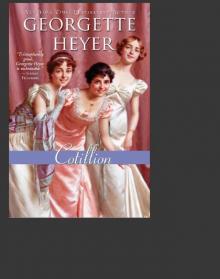 Cotillion
Cotillion Frederica
Frederica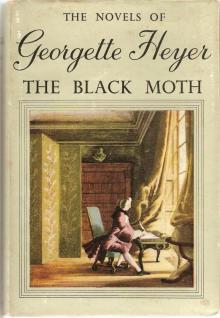 The Black Moth: A Romance of the XVIIIth Century
The Black Moth: A Romance of the XVIIIth Century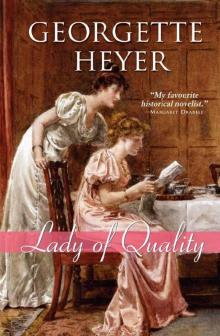 Lady of Quality
Lady of Quality Snowdrift and Other Stories
Snowdrift and Other Stories An Infamous Army
An Infamous Army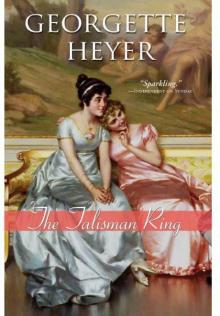 The Talisman Ring
The Talisman Ring Venetia
Venetia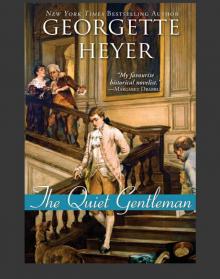 The Quiet Gentleman
The Quiet Gentleman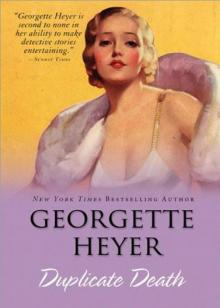 Duplicate Death
Duplicate Death Cousin Kate
Cousin Kate Black Sheep
Black Sheep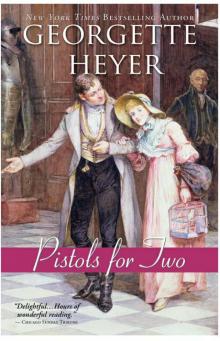 Pistols for Two
Pistols for Two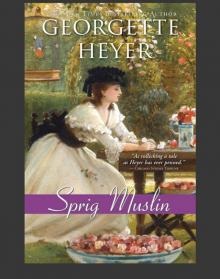 Sprig Muslin
Sprig Muslin No Wind of Blame
No Wind of Blame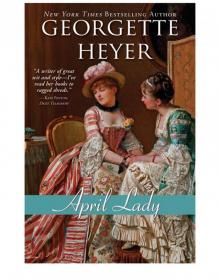 April Lady
April Lady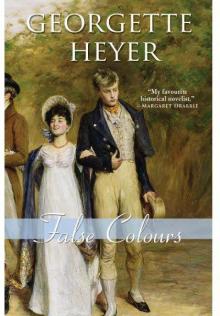 False Colours
False Colours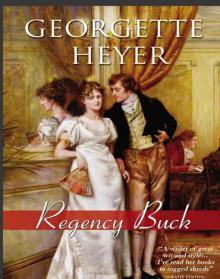 Regency Buck
Regency Buck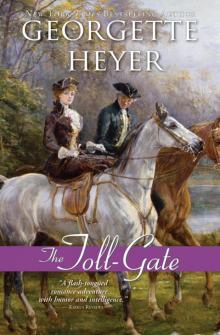 The Toll-Gate
The Toll-Gate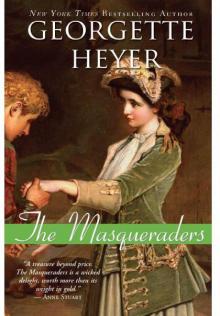 The Masqueraders
The Masqueraders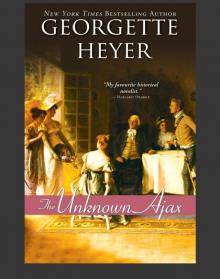 The Unknown Ajax
The Unknown Ajax The Grand Sophy
The Grand Sophy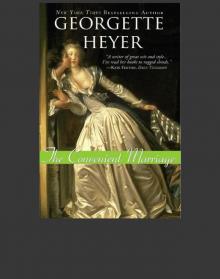 The Convenient Marriage
The Convenient Marriage Faro's Daughter
Faro's Daughter The Conqueror
The Conqueror The Foundling
The Foundling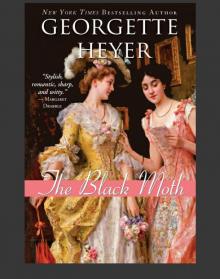 The Black Moth
The Black Moth The Transformation of Philip Jettan
The Transformation of Philip Jettan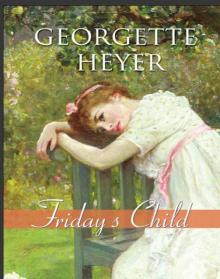 Friday's Child
Friday's Child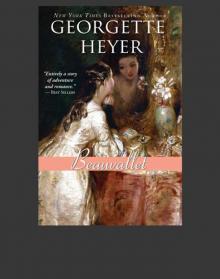 Beauvallet
Beauvallet They Found Him Dead
They Found Him Dead Charity Girl
Charity Girl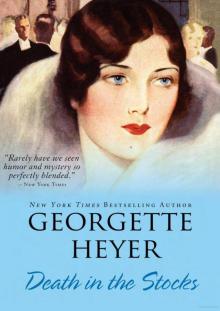 Death in the Stocks: Merely Murder
Death in the Stocks: Merely Murder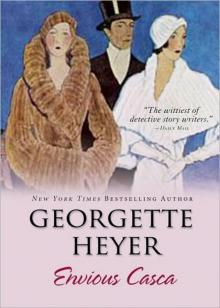 Envious Casca
Envious Casca Behold, Here's Poison
Behold, Here's Poison Arabella
Arabella The Nonesuch
The Nonesuch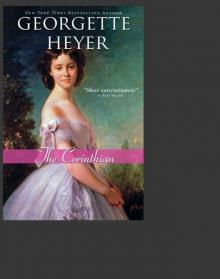 The Corinthian
The Corinthian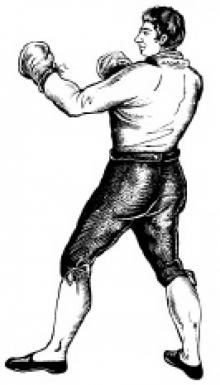 Jennifer Kloester
Jennifer Kloester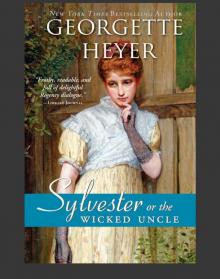 Sylvester
Sylvester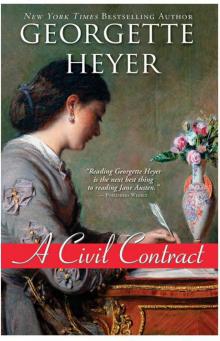 A Civil Contract
A Civil Contract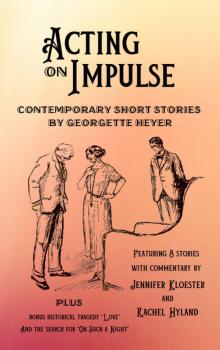 Acting on Impulse
Acting on Impulse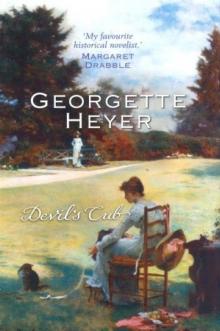 Devil’s Cub at-2
Devil’s Cub at-2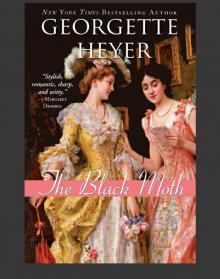 Black Moth
Black Moth Grand Sophy
Grand Sophy Instead of the Thorn
Instead of the Thorn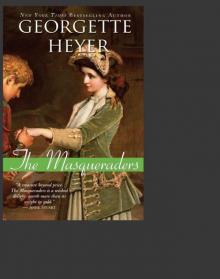 Masqueraders
Masqueraders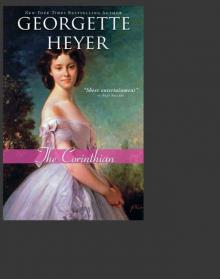 Corinthian
Corinthian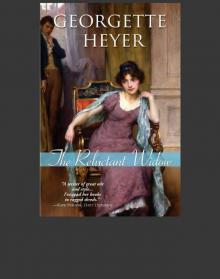 Reluctant Widow
Reluctant Widow